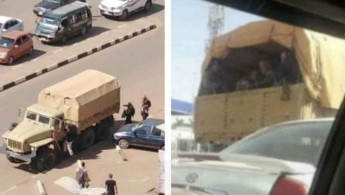Sudan denies using Russian mercenaries in deadly protest crackdown
Sudan has denied a report that Russian mercenaries are helping the government stamp out nationwide protests against skyrocketing prices and a failing economy
Interior Minister Ahmed Bilal Osman told The New Arab's Arabic-language service on Friday that the report was "completely false".
"This is just a fabrication designed to insult the government. If there were Russians on the ground the demonstrators would report it," Osman said.
"The situation isn't so bad that mercenaries would need to step in," he added.
British daily The Times reported on Thursday that Russian-speaking mercenaries had been seen and photographed in the Sudanese capital Khartoum.
Citing opposition sources, the newspaper said guns for hire from a Russian private security company, the Wagner Group, are providing strategic and practical training to the Sudanese security forces.
"Hundreds of Wagner personnel are believed to have been deployed to Sudan’s neighbour, the Central African Republic, last year to help train troops," the report said.
The Times published a blurry image of white men dressed in camouflage being transported in military trucks.
Authorities say the protests have left 24 people dead, while Human Rights Watch has put the death toll at 40, including children and medical staff.
Protest organisers have called for daily demonstrations across the country calling for the ousting of autocratic President Omar al-Bashir, calling it a "Week of Uprising".
Sudanese police fired tear gas on Sunday again at crowds of anti-government protesters in Khartoum and the western war-torn region of Darfur after organisers called for the nationwide rallies against Bashir.
Anti-government demonstrations first erupted on December 19 over the rise in the price of bread in towns and villages before later spreading to Khartoum.
Rights groups say more than 1,000 people have been arrested since the protests began, including opposition leaders, activists and journalists as well as demonstrators.
The crackdown has drawn international criticism, with countries like Britain, Norway, Canada and the United States warning Khartoum that its actions could "have an impact" on its relations with their governments.





 Follow the Middle East's top stories in English at The New Arab on Google News
Follow the Middle East's top stories in English at The New Arab on Google News


